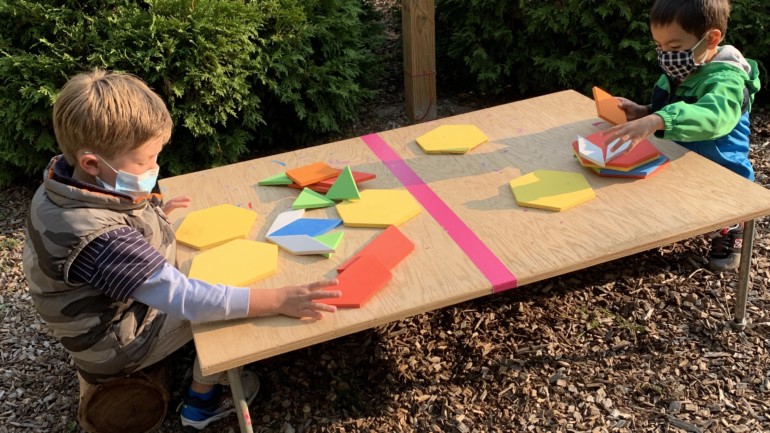Play is essential for children. Unstructured, imaginative play is key to so many aspects of a child’s cognitive growth, including language development, the nuances of socialization and creative problem solving.
The research on the neurological effects of play is clear: “Play is not frivolous: it enhances brain structure and function and promotes executive function, which allows us to pursue goals and ignore distractions,” states the American Academy of Pediatrics. Without play’s influence, children can experience higher levels of toxic stress, delays in prosocial behavior and underdeveloped executive functioning skills.

Play-based programs are even more important in the midst of a pandemic. And like most things in this current reality, the plans and programs at Baker Demonstration School have been altered in order to support the health and safety of Baker’s community of children and teachers.
Outdoor Classrooms
Baker’s preschool and kindergarten outdoor classrooms were designed by teachers to provide more outdoor play opportunities for children in the midst of the pandemic, with a mud kitchen, tools for structure building, tables for outdoor art making, and an area where loose parts inspire engineering and design.

Each of these tools in the outdoor classroom serve as provocations for children. The loose parts, for example, can become a moving fire truck or a transatlantic flight. The child’s imagination awakens to limitless possibilities. Their language, used purposefully to enact the story, grows as they engage in the complexity of these nuanced interactions with peers and teachers.
Identity
One of the goals of a play-based program is for students to develop their unique sense of self and awareness of others in the community. As children take on various roles through play, their sense of belonging in a wider circle outside of their family is developed. When we think about the ways that children’s lives have been altered in the pandemic, we want to ensure that their sense of self and their understanding of others is developed by their interactions in the classroom community.

Wandering Wednesday
Each Wednesday, Baker Demonstration School’s kindergartners, dressed for adventure whether rain or shine, head off campus on a beloved tradition called Wandering Wednesday. Whether they walk to Evanston’s Lighthouse Beach or explore Isabella Woods, adjacent to the school campus, opportunities for learning arise from a rotting log, a path of acorns, or a mound of insects — all ready for close inspection. In a normal year, the kindergartners also use public transportation to reach more distant destinations like Harms Woods. For now in the pandemic, this is one tradition that carries on, allowing students to healthily explore the outdoors while wearing masks.

Play is central to the development of young children — whether in a pandemic or not. Baker teachers facilitate these essential experiences in order to support children’s developing language abilities, strong sense of self and prosocial skills. Their design of these spaces and experiences speaks to their own creativity, a central outcome of play — the ability to adjust, revise and wonder anew at the amazing world. Even in a pandemic.

